完形填空的解题方法
图片预览
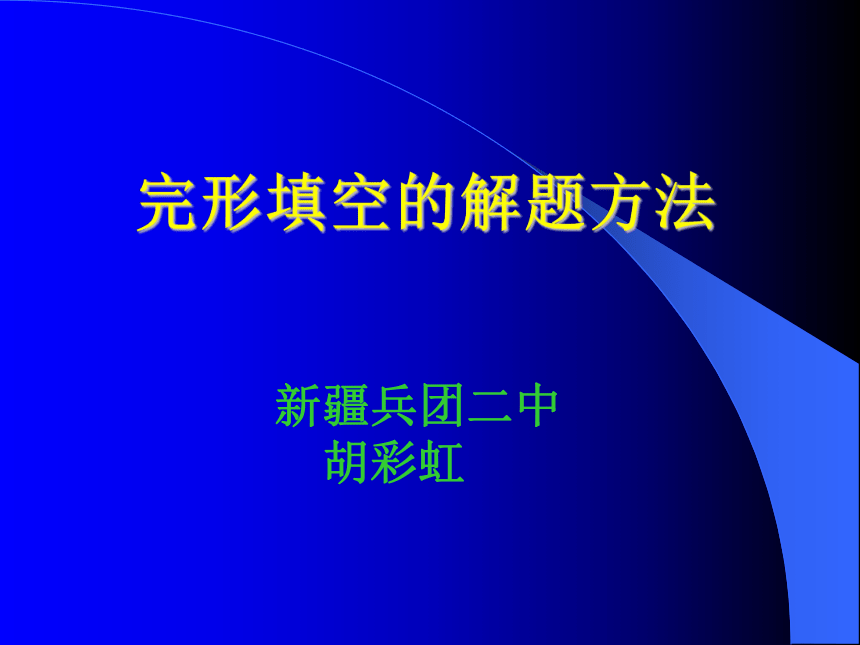
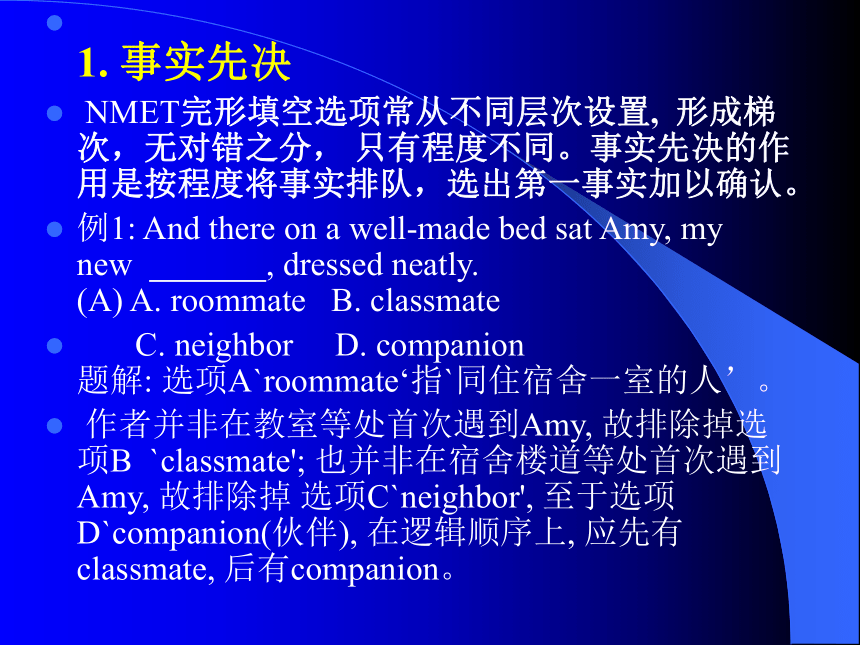
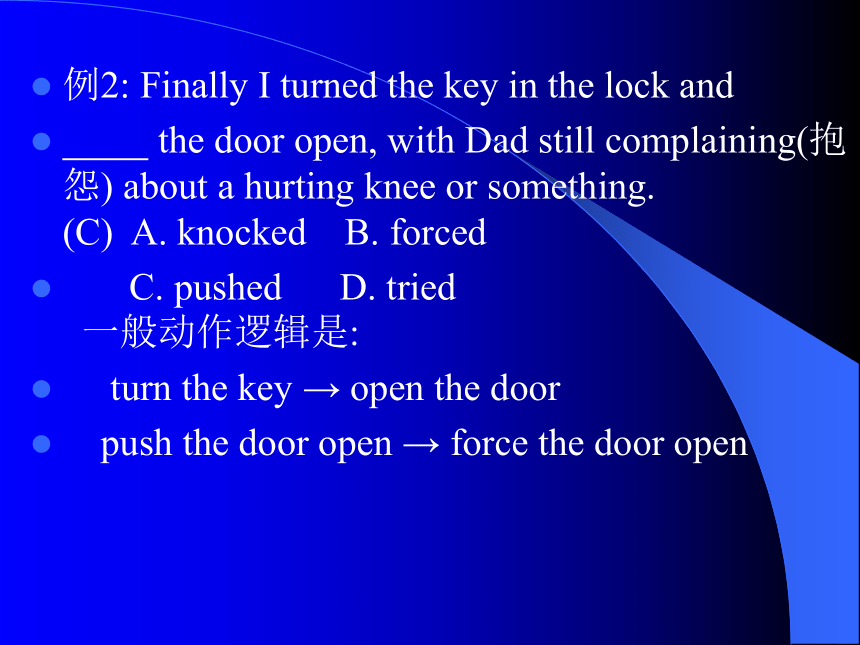
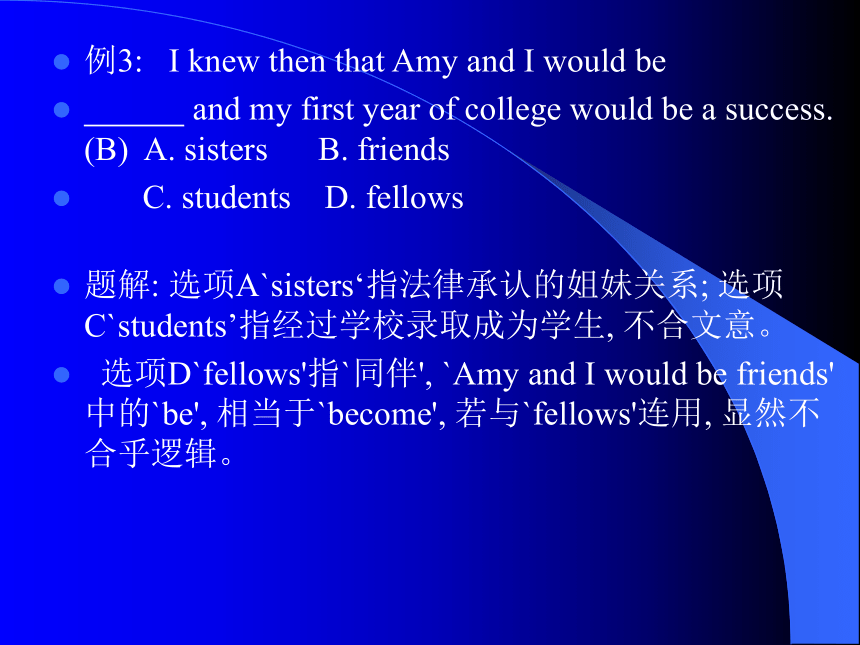
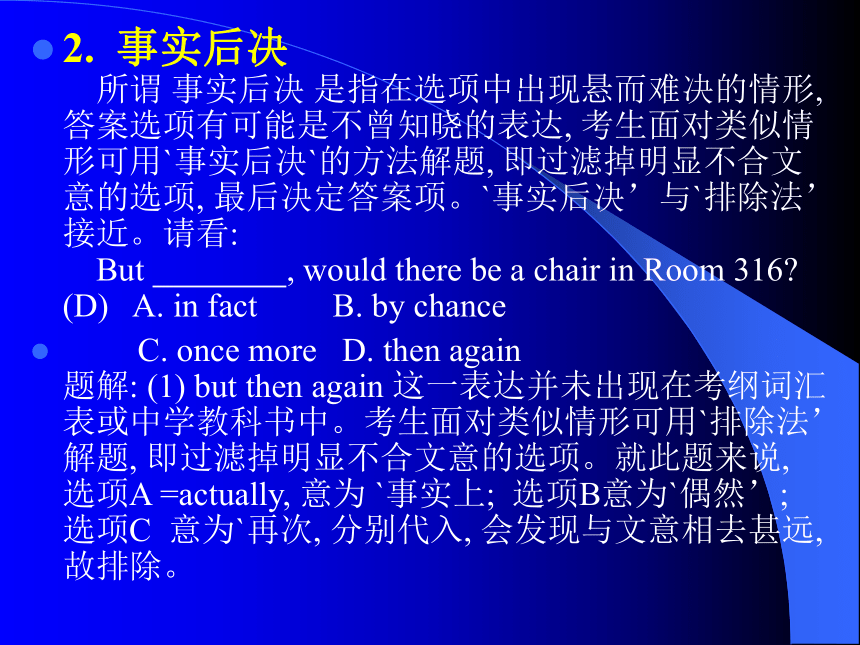
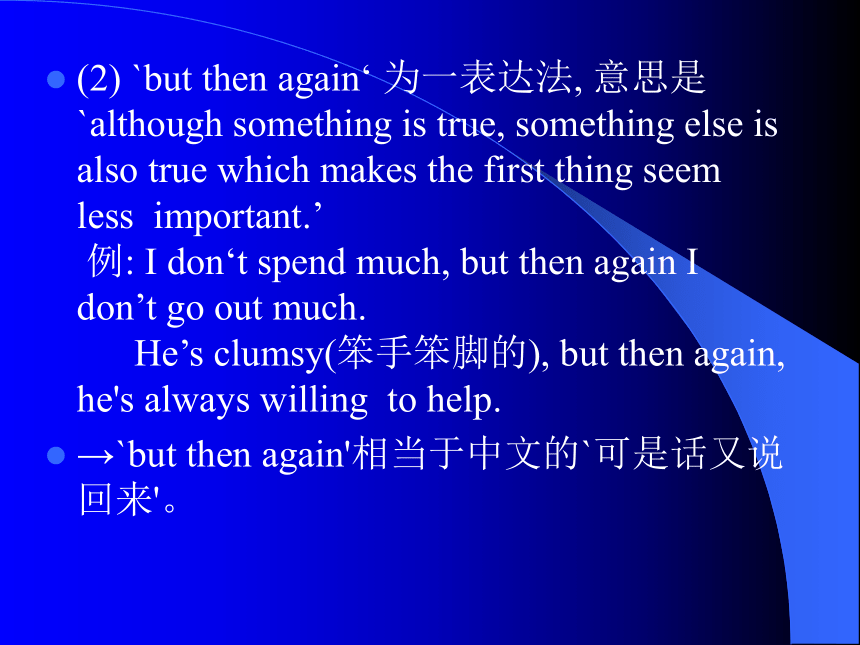
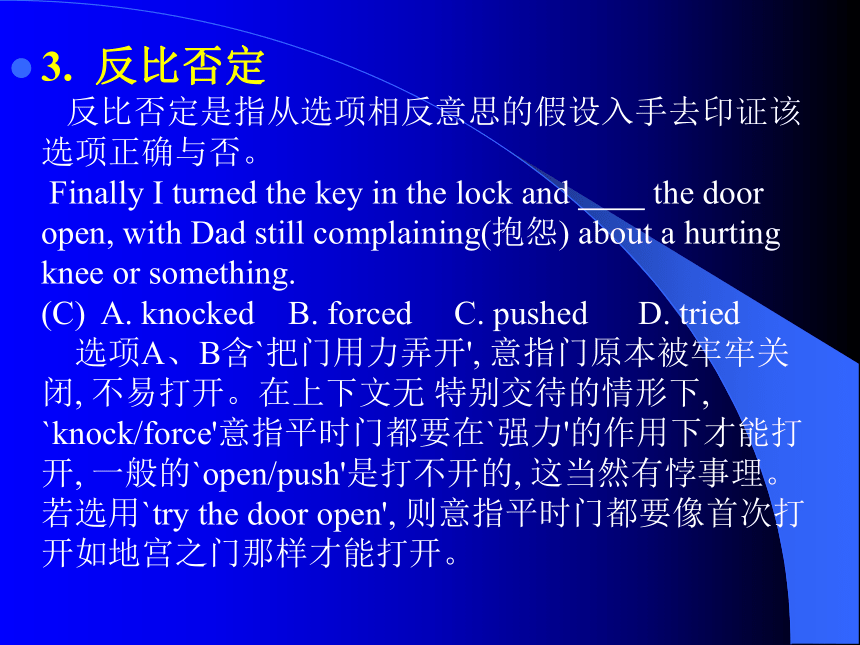
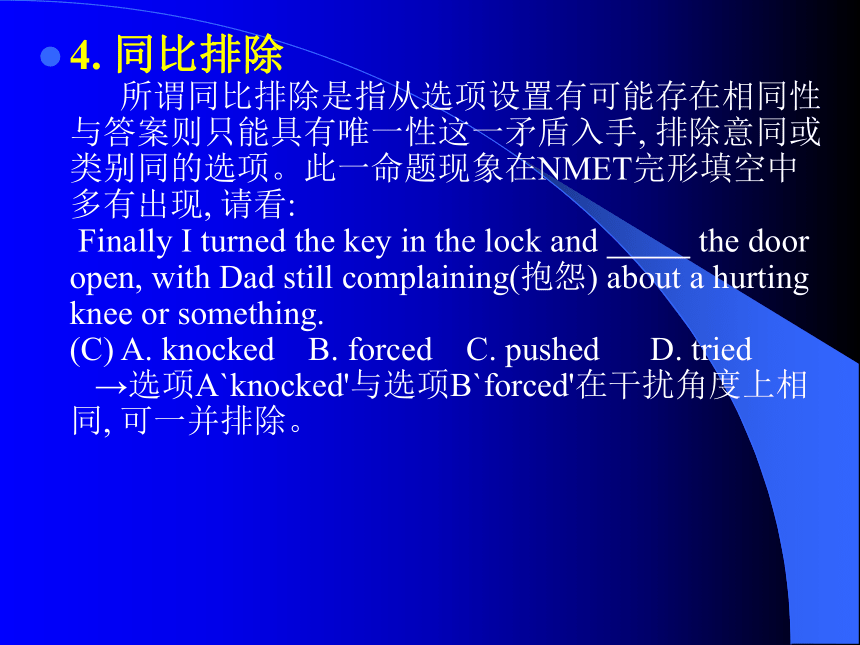
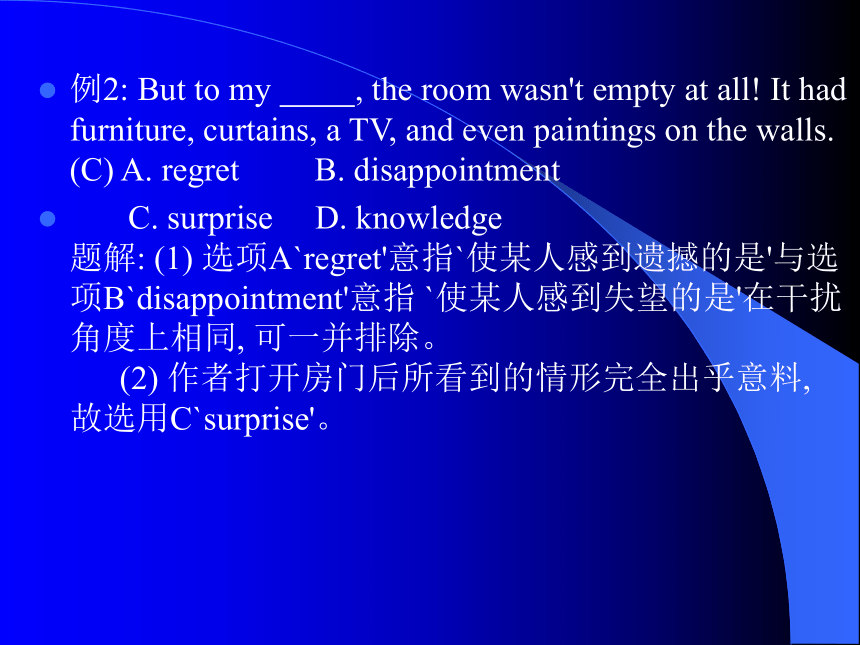
文档简介
课件27张PPT。完形填空的解题方法
新疆兵团二中
胡彩虹 1. 事实先决
NMET完形填空选项常从不同层次设置, 形成梯次,无对错之分, 只有程度不同。事实先决的作用是按程度将事实排队,选出第一事实加以确认。
例1: And there on a well-made bed sat Amy, my new , dressed neatly. (A) A. roommate B. classmate
C. neighbor D. companion 题解: 选项A`roommate‘指`同住宿舍一室的人’。
作者并非在教室等处首次遇到Amy, 故排除掉选项B `classmate'; 也并非在宿舍楼道等处首次遇到Amy, 故排除掉 选项C`neighbor', 至于选项D`companion(伙伴), 在逻辑顺序上, 应先有 classmate, 后有companion。 例2: Finally I turned the key in the lock and
the door open, with Dad still complaining(抱怨) about a hurting knee or something. (C) A. knocked B. forced
C. pushed D. tried 一般动作逻辑是:
turn the key → open the door
push the door open → force the door open 例3: I knew then that Amy and I would be
and my first year of college would be a success. (B) A. sisters B. friends
C. students D. fellows
题解: 选项A`sisters‘指法律承认的姐妹关系; 选项C`students’指经过学校录取成为学生, 不合文意。
选项D`fellows'指`同伴', `Amy and I would be friends' 中的`be', 相当于`become', 若与`fellows'连用, 显然不合乎逻辑。 2. 事实后决 所谓 事实后决 是指在选项中出现悬而难决的情形, 答案选项有可能是不曾知晓的表达, 考生面对类似情形可用`事实后决`的方法解题, 即过滤掉明显不合文意的选项, 最后决定答案项。`事实后决’与`排除法’接近。请看: But , would there be a chair in Room 316? (D) A. in fact B. by chance
C. once more D. then again 题解: (1) but then again 这一表达并未出现在考纲词汇表或中学教科书中。考生面对类似情形可用`排除法’解题, 即过滤掉明显不合文意的选项。就此题来说, 选项A =actually, 意为 `事实上; 选项B意为`偶然’; 选项C 意为`再次, 分别代入, 会发现与文意相去甚远, 故排除。 (2) `but then again‘ 为一表达法, 意思是`although something is true, something else is also true which makes the first thing seem less important.’ 例: I don‘t spend much, but then again I don’t go out much. He’s clumsy(笨手笨脚的), but then again, he's always willing to help.
→`but then again'相当于中文的`可是话又说回来'。 3. 反比否定 反比否定是指从选项相反意思的假设入手去印证该选项正确与否。 Finally I turned the key in the lock and the door open, with Dad still complaining(抱怨) about a hurting knee or something. (C) A. knocked B. forced C. pushed D. tried 选项A、B含`把门用力弄开', 意指门原本被牢牢关闭, 不易打开。在上下文无 特别交待的情形下, `knock/force'意指平时门都要在`强力'的作用下才能打开, 一般的`open/push'是打不开的, 这当然有悖事理。若选用`try the door open', 则意指平时门都要像首次打开如地宫之门那样才能打开。 4. 同比排除 所谓同比排除是指从选项设置有可能存在相同性与答案则只能具有唯一性这一矛盾入手, 排除意同或类别同的选项。此一命题现象在NMET完形填空中多有出现, 请看: Finally I turned the key in the lock and the door open, with Dad still complaining(抱怨) about a hurting knee or something. (C) A. knocked B. forced C. pushed D. tried →选项A`knocked'与选项B`forced'在干扰角度上相同, 可一并排除。 例2: But to my , the room wasn't empty at all! It had furniture, curtains, a TV, and even paintings on the walls. (C) A. regret B. disappointment
C. surprise D. knowledge 题解: (1) 选项A`regret'意指`使某人感到遗撼的是'与选项B`disappointment'意指 `使某人感到失望的是'在干扰角度上相同, 可一并排除。 (2) 作者打开房门后所看到的情形完全出乎意料, 故选用C`surprise'。 例3: Greeting me with a nod, she said in a soft voice, “Hi, you must be Cori.” Then, she the music and looked over at Dad. (B) A. turned on B. turned down
C. played D. enjoyed
题解: (1) 通过下文Amy邀请作者的父亲喝冰茶 “Would you like a glass of iced tea?”可以断定Amy是一位有礼貌的姑娘。与此相联系的动作应是`turn down the music(把音乐的声音关小)。 (2) 选项A、D、C在干扰角度上相近。 例4: “And of course, you‘re Mr. Faber,” she said, . (C) A. questioning B. wondering
C. smiling D. guessing 选项A、B、D也存在干扰角度上相近的现象。 NMET完形填空题解
As a child, I was truly afraid of the dark and of getting lost; these fears were very real and caused me some uncomfortable moments. Maybe it was the strange 1 things looked and sounded in my familiar room at night that 2 me so much.
(A) 1. A. way B. time C. place D. reason 题解:
i. 该句为一强调句式, 即[It is + 强调物 + that 从句]. ii. 选项A`way‘其后所跟的从句可用或不用连接词
that将其引出。 例: I don’t like the way (that) you talk to me. Let‘s go the way (that) we went yesterday.
(D) 2. A. wounded B. destroyed
C. surprised D. frightened 根据文章开头所述的`was truly afraid of...', 以及`these fears...' 将答案定在`frightened'。 There was never total 3 , but a streetlight or passing car lights 4 clothes hung over a chair take on the 5 of a wild animal.
(B) 3. A. quietness B. darkness
C. emptiness D. loneliness 题解: (3) `never total darkness‘ 为部分否定, 意为`并非完全漆黑一片’。选项A`quietness寂静‘, 选项C `emptiness空旷’, 以及选项D`loneliness孤独‘ 因分别真对`热闹’, `密集‘, 以及`陪伴’而言, 与文章风马牛不相及, 故不用。 (C) 4. A. got B. forced C. made D. caused 该题为[make + 宾语 + 过去分词]句式。 (D) 5. A. spirit B. height C. body D. shape
`take on‘意为`呈现’, 可与选项D shape搭配使用, 表示`呈现...的形状‘。 若选用选项B或C, 则给
人真有`a wild animal'之嫌。
Out of the corner of my 6 , I saw the curtains seem to move when there was no 7 . A tiny sound in the floor would seem a hundred times louder than in the daylight.
(A) 6. A. eye B. window C. mouth D. door
题解: (6) `out of the corner of my eye'意为`透过我的眼角', 把作者当时由于害怕而不感`正视'的特点生动地表现出来。而选项C则指`从我的嘴角出来'。 此外, 选项B、D也无法与题干中的`my'形成搭配, 故不用。
(B) 7. A. breath B. wind C. air D. sound 题干中的`move'是关键词, 引出选项B`wind'。 My 8 would run wild, and my heart would beat fast. I would 9 very still so that the "enemy" would not discover me. (C) 8. A. belief B. feeling C. imagination D. doubt 题解: 答案项`imagination‘若根据所述似乎信息支持不足。若先做第9题, 获得 `the “enemy” would not discover me’ 这样清晰的`想象‘, 则此题可解。 (D) 9. A. lay B. hide C. rest D. lie
题解: `lie very still'意为`一动不动地躺着'; 而lay(放置)、hide(躲藏)均为及物动词, 并与题意相去甚远, 故不用。
Another of my childhood fears was that I would get lost, 10 on the way home from school.
A) 10. A. especially B. simply C. probably D. directly 题解: `especially‘用于补述其前内容的场合, 常和状语连用。请看例句: ① It’s always difficult being in a foreign country,
D if you don't speak the language. A. extremely B. naturally C. basically D. especially ② I like the country, especially in spring. ③ Noise is unpleasant, especially when you are trying to sleep. ④ I expected a more enthusiastic(热情的) welcome, especially considering it is the first time I have come here. Every morning I got on the school bus right near my home---that was no 11 . (B) 11. A. discussion B. problem
C. joke D. matter 题解: `no problem'为一固定表达, 意为`轻松, 无烦恼 =no difficulty' . After school, 12 , when all the buses were 13 up along the street, I was afraid that I‘d get on the wrong one and betaken to some 14 neighborhood. (A) 12. A. though B. yet C. although D. still 答案项`though'用作副词, 意为`however'。 例1: --Nice day. --Yes. Bit cold, though. 例2: The strongest argument, though, is
economic(经济上的) and not political.
(C) 13. A. called B. backed
C. lined D. packed 测试表达法 `be lined up‘,意为`列成队'。 (D) 14. A. old B. crowded
C. poor D. unfamiliar 通过本段信息`would get lost / the school bus right near my home / 以及`get on the wrong one'可以顺理成章地推断出选项D`unfamiliar'。
On school or family trips to a park or a museum, I wouldn‘t 15 the leaders out of my sight. (B) 15. A. leave B. let
C. order D. send 题解: i. `I wouldn't let the leaders out of my sight.' 意思是`我会紧紧地盯住负责人。' ii. 选项A leave、选项C order、选项D send 都无法与题干中`out of my sight'形成搭配。 Perhaps one of the worst fears 16 all I had as a child was that of not being liked or 17 by others.
(C) 16. A. above B. in C. of D. at 此题测试比较句型: [the + 最高级比较形式 + of / among + 三者或三者以上]
(D) 17. A. protected B. guided C. believed D. accepted
题干`that of not being liked or accepted by others'中的`that' 指`the fear', 连词`or'连接的部分实际上应是后者对前者所作的进一步解释。 4个选项中, 选项D`accepted' 意为`被接纳', 在意思上最接近 `liked'。 Being popular was so important to me 18 , and the fear of not being liked was a 19 one. (A) 18. A. then B. there C. once D. anyway `then' =at that time (B) 19. A. strict B. powerful
C. heavy D. right `powerful‘ 表程度, 意为`极强烈的’, 而选项A strict(严格的)、选项C heavy(沉重的), 以及选项D right (正确的)都无法与题干中的`the fear'形成搭配, 故不用。 One of the processes(过程) of growing up is being able to 20 and overcome our fears. (C) 20. A. realize B. remember
C. recognize D. recover 译: 成长的一个过程就是能够清楚地看到我们自身所产生的畏惧感, 并加以克服。 此题有一定难度。问题集中在对选项A `realize' 以及选项C `recognize' 之间意思差异的辨别上。 realize = understand and believe (a fact) He didn't realize he was wrong. recognize =see clearly(清楚地看到);know and remember someone or something one has seen before I recognize that she was the best worker we have. `realize'意思是`意识到', 多指首次意识; `recognize'意思是`识别出', 多指识别出过去见过的。
新疆兵团二中
胡彩虹 1. 事实先决
NMET完形填空选项常从不同层次设置, 形成梯次,无对错之分, 只有程度不同。事实先决的作用是按程度将事实排队,选出第一事实加以确认。
例1: And there on a well-made bed sat Amy, my new , dressed neatly. (A) A. roommate B. classmate
C. neighbor D. companion 题解: 选项A`roommate‘指`同住宿舍一室的人’。
作者并非在教室等处首次遇到Amy, 故排除掉选项B `classmate'; 也并非在宿舍楼道等处首次遇到Amy, 故排除掉 选项C`neighbor', 至于选项D`companion(伙伴), 在逻辑顺序上, 应先有 classmate, 后有companion。 例2: Finally I turned the key in the lock and
the door open, with Dad still complaining(抱怨) about a hurting knee or something. (C) A. knocked B. forced
C. pushed D. tried 一般动作逻辑是:
turn the key → open the door
push the door open → force the door open 例3: I knew then that Amy and I would be
and my first year of college would be a success. (B) A. sisters B. friends
C. students D. fellows
题解: 选项A`sisters‘指法律承认的姐妹关系; 选项C`students’指经过学校录取成为学生, 不合文意。
选项D`fellows'指`同伴', `Amy and I would be friends' 中的`be', 相当于`become', 若与`fellows'连用, 显然不合乎逻辑。 2. 事实后决 所谓 事实后决 是指在选项中出现悬而难决的情形, 答案选项有可能是不曾知晓的表达, 考生面对类似情形可用`事实后决`的方法解题, 即过滤掉明显不合文意的选项, 最后决定答案项。`事实后决’与`排除法’接近。请看: But , would there be a chair in Room 316? (D) A. in fact B. by chance
C. once more D. then again 题解: (1) but then again 这一表达并未出现在考纲词汇表或中学教科书中。考生面对类似情形可用`排除法’解题, 即过滤掉明显不合文意的选项。就此题来说, 选项A =actually, 意为 `事实上; 选项B意为`偶然’; 选项C 意为`再次, 分别代入, 会发现与文意相去甚远, 故排除。 (2) `but then again‘ 为一表达法, 意思是`although something is true, something else is also true which makes the first thing seem less important.’ 例: I don‘t spend much, but then again I don’t go out much. He’s clumsy(笨手笨脚的), but then again, he's always willing to help.
→`but then again'相当于中文的`可是话又说回来'。 3. 反比否定 反比否定是指从选项相反意思的假设入手去印证该选项正确与否。 Finally I turned the key in the lock and the door open, with Dad still complaining(抱怨) about a hurting knee or something. (C) A. knocked B. forced C. pushed D. tried 选项A、B含`把门用力弄开', 意指门原本被牢牢关闭, 不易打开。在上下文无 特别交待的情形下, `knock/force'意指平时门都要在`强力'的作用下才能打开, 一般的`open/push'是打不开的, 这当然有悖事理。若选用`try the door open', 则意指平时门都要像首次打开如地宫之门那样才能打开。 4. 同比排除 所谓同比排除是指从选项设置有可能存在相同性与答案则只能具有唯一性这一矛盾入手, 排除意同或类别同的选项。此一命题现象在NMET完形填空中多有出现, 请看: Finally I turned the key in the lock and the door open, with Dad still complaining(抱怨) about a hurting knee or something. (C) A. knocked B. forced C. pushed D. tried →选项A`knocked'与选项B`forced'在干扰角度上相同, 可一并排除。 例2: But to my , the room wasn't empty at all! It had furniture, curtains, a TV, and even paintings on the walls. (C) A. regret B. disappointment
C. surprise D. knowledge 题解: (1) 选项A`regret'意指`使某人感到遗撼的是'与选项B`disappointment'意指 `使某人感到失望的是'在干扰角度上相同, 可一并排除。 (2) 作者打开房门后所看到的情形完全出乎意料, 故选用C`surprise'。 例3: Greeting me with a nod, she said in a soft voice, “Hi, you must be Cori.” Then, she the music and looked over at Dad. (B) A. turned on B. turned down
C. played D. enjoyed
题解: (1) 通过下文Amy邀请作者的父亲喝冰茶 “Would you like a glass of iced tea?”可以断定Amy是一位有礼貌的姑娘。与此相联系的动作应是`turn down the music(把音乐的声音关小)。 (2) 选项A、D、C在干扰角度上相近。 例4: “And of course, you‘re Mr. Faber,” she said, . (C) A. questioning B. wondering
C. smiling D. guessing 选项A、B、D也存在干扰角度上相近的现象。 NMET完形填空题解
As a child, I was truly afraid of the dark and of getting lost; these fears were very real and caused me some uncomfortable moments. Maybe it was the strange 1 things looked and sounded in my familiar room at night that 2 me so much.
(A) 1. A. way B. time C. place D. reason 题解:
i. 该句为一强调句式, 即[It is + 强调物 + that 从句]. ii. 选项A`way‘其后所跟的从句可用或不用连接词
that将其引出。 例: I don’t like the way (that) you talk to me. Let‘s go the way (that) we went yesterday.
(D) 2. A. wounded B. destroyed
C. surprised D. frightened 根据文章开头所述的`was truly afraid of...', 以及`these fears...' 将答案定在`frightened'。 There was never total 3 , but a streetlight or passing car lights 4 clothes hung over a chair take on the 5 of a wild animal.
(B) 3. A. quietness B. darkness
C. emptiness D. loneliness 题解: (3) `never total darkness‘ 为部分否定, 意为`并非完全漆黑一片’。选项A`quietness寂静‘, 选项C `emptiness空旷’, 以及选项D`loneliness孤独‘ 因分别真对`热闹’, `密集‘, 以及`陪伴’而言, 与文章风马牛不相及, 故不用。 (C) 4. A. got B. forced C. made D. caused 该题为[make + 宾语 + 过去分词]句式。 (D) 5. A. spirit B. height C. body D. shape
`take on‘意为`呈现’, 可与选项D shape搭配使用, 表示`呈现...的形状‘。 若选用选项B或C, 则给
人真有`a wild animal'之嫌。
Out of the corner of my 6 , I saw the curtains seem to move when there was no 7 . A tiny sound in the floor would seem a hundred times louder than in the daylight.
(A) 6. A. eye B. window C. mouth D. door
题解: (6) `out of the corner of my eye'意为`透过我的眼角', 把作者当时由于害怕而不感`正视'的特点生动地表现出来。而选项C则指`从我的嘴角出来'。 此外, 选项B、D也无法与题干中的`my'形成搭配, 故不用。
(B) 7. A. breath B. wind C. air D. sound 题干中的`move'是关键词, 引出选项B`wind'。 My 8 would run wild, and my heart would beat fast. I would 9 very still so that the "enemy" would not discover me. (C) 8. A. belief B. feeling C. imagination D. doubt 题解: 答案项`imagination‘若根据所述似乎信息支持不足。若先做第9题, 获得 `the “enemy” would not discover me’ 这样清晰的`想象‘, 则此题可解。 (D) 9. A. lay B. hide C. rest D. lie
题解: `lie very still'意为`一动不动地躺着'; 而lay(放置)、hide(躲藏)均为及物动词, 并与题意相去甚远, 故不用。
Another of my childhood fears was that I would get lost, 10 on the way home from school.
A) 10. A. especially B. simply C. probably D. directly 题解: `especially‘用于补述其前内容的场合, 常和状语连用。请看例句: ① It’s always difficult being in a foreign country,
D if you don't speak the language. A. extremely B. naturally C. basically D. especially ② I like the country, especially in spring. ③ Noise is unpleasant, especially when you are trying to sleep. ④ I expected a more enthusiastic(热情的) welcome, especially considering it is the first time I have come here. Every morning I got on the school bus right near my home---that was no 11 . (B) 11. A. discussion B. problem
C. joke D. matter 题解: `no problem'为一固定表达, 意为`轻松, 无烦恼 =no difficulty' . After school, 12 , when all the buses were 13 up along the street, I was afraid that I‘d get on the wrong one and betaken to some 14 neighborhood. (A) 12. A. though B. yet C. although D. still 答案项`though'用作副词, 意为`however'。 例1: --Nice day. --Yes. Bit cold, though. 例2: The strongest argument, though, is
economic(经济上的) and not political.
(C) 13. A. called B. backed
C. lined D. packed 测试表达法 `be lined up‘,意为`列成队'。 (D) 14. A. old B. crowded
C. poor D. unfamiliar 通过本段信息`would get lost / the school bus right near my home / 以及`get on the wrong one'可以顺理成章地推断出选项D`unfamiliar'。
On school or family trips to a park or a museum, I wouldn‘t 15 the leaders out of my sight. (B) 15. A. leave B. let
C. order D. send 题解: i. `I wouldn't let the leaders out of my sight.' 意思是`我会紧紧地盯住负责人。' ii. 选项A leave、选项C order、选项D send 都无法与题干中`out of my sight'形成搭配。 Perhaps one of the worst fears 16 all I had as a child was that of not being liked or 17 by others.
(C) 16. A. above B. in C. of D. at 此题测试比较句型: [the + 最高级比较形式 + of / among + 三者或三者以上]
(D) 17. A. protected B. guided C. believed D. accepted
题干`that of not being liked or accepted by others'中的`that' 指`the fear', 连词`or'连接的部分实际上应是后者对前者所作的进一步解释。 4个选项中, 选项D`accepted' 意为`被接纳', 在意思上最接近 `liked'。 Being popular was so important to me 18 , and the fear of not being liked was a 19 one. (A) 18. A. then B. there C. once D. anyway `then' =at that time (B) 19. A. strict B. powerful
C. heavy D. right `powerful‘ 表程度, 意为`极强烈的’, 而选项A strict(严格的)、选项C heavy(沉重的), 以及选项D right (正确的)都无法与题干中的`the fear'形成搭配, 故不用。 One of the processes(过程) of growing up is being able to 20 and overcome our fears. (C) 20. A. realize B. remember
C. recognize D. recover 译: 成长的一个过程就是能够清楚地看到我们自身所产生的畏惧感, 并加以克服。 此题有一定难度。问题集中在对选项A `realize' 以及选项C `recognize' 之间意思差异的辨别上。 realize = understand and believe (a fact) He didn't realize he was wrong. recognize =see clearly(清楚地看到);know and remember someone or something one has seen before I recognize that she was the best worker we have. `realize'意思是`意识到', 多指首次意识; `recognize'意思是`识别出', 多指识别出过去见过的。
同课章节目录
